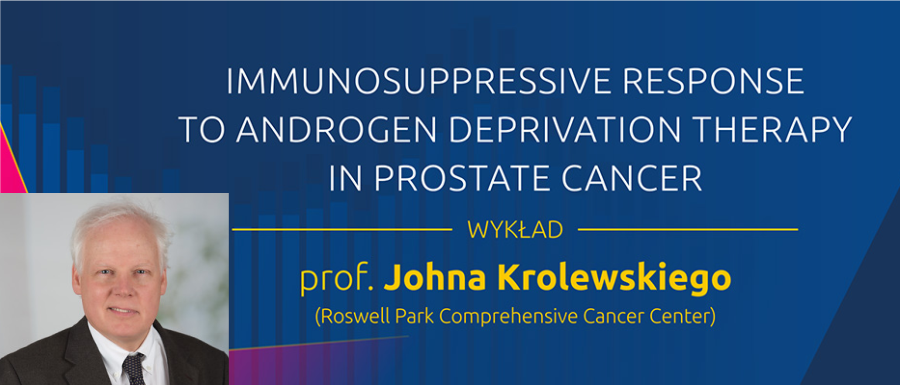Prof. John Krolewski jest absolwentem Massachusetts Institute of Technology oraz New York University Medical School. Pracował na Uniwersytetach Columbia, Irvine i Rochester, od 2015 roku jest profesorem onkologii, a od 2017 r. kieruje Katedrą Genetyki i Genomiki w Roswell Park Comprehensive Cancer Center. Obecne jego zainteresowania skupiają się na wdrożeniach personalizowanego leczenia nowotworów stercza, jajnika, czerniaka oraz nowotworów rodzinnych.
Wykład odbywa się w ramach współpracy nawiązanej w 2018 roku między Uniwersytetem Jagiellońskim - Collegium Medicum i Wydziałem Biochemii, Biofizyki i Biotechnologii UJ a Roswell Park Comprehensive Cancer Center. Po wykładzie planowana jest dyskusja na temat rozwoju programu genomiki translacyjnej/onkologii spersonalizowanej, którego jednym z celów byłaby wymiana młodej kadry naukowej i możliwość odbycia stażów w Roswell Park Comprehensive Cancer Center.
Wykład w języku angielskim.
Summary: Immunosuppressive response to androgen deprivation therapy in prostate cancer
Prostate cancer is the most frequent visceral cancer among men in the US. Most prostate cancers are indolent and can be cured by surgery or radiation or may not require treatment at all. However, a small percent progress and are typically treated with androgen deprivation therapy (ADT). The treatment is initially effective, but invariably fails, leading to the development of lethal castration-resistant prostate cancer. Our group has been using genetic murine models to understand the molecular mechanisms involved in the development of resistance to ADT. In a PTEN-deficient prostate cancer model, ADT (castration) induces tumor regression, followed by selection of a resistant, stem cell-like tumor cell population and – subsequently – tumor recurrence. The recurrent state is primarily driven by an immuno-suppressive tumor microenvironment. Specifically, we show that increased TNF production by the resistant tumor cell population induces CCL2 expression in the tumor microenvironment, which recruits tumor associated macrophages, and perhaps additional immuno-suppressive cell populations, and reduces the CD8 T-cell population. These results suggest that a combination of ADT and therapies that counter myeloid suppression might be effective in preventing the progression of high risk or locally advanced prostate cancer.
